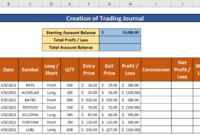Kicking off with Common Forex trading mistakes, this discussion dives into the errors that beginner traders commonly make in the market, and how to steer clear of them for a profitable trading journey.
Common Forex Trading Mistakes

When it comes to Forex trading, beginners often make common mistakes that can have a significant impact on their trading performance. It is crucial to identify these pitfalls and implement strategies to avoid falling into them.
Overleveraging
One common mistake made by beginner traders is overleveraging their trades. This means using too much leverage, which can amplify both profits and losses. While it may seem tempting to increase potential gains, overleveraging can lead to significant losses if the market moves against you.
For those who are new to Forex trading, understanding the basics is crucial. Learning about different currency pairs, market trends, and risk management are all essential components of Forex trading for beginners. With the right knowledge and tools, beginners can start their trading journey successfully.
Lack of Risk Management
Another mistake is the lack of proper risk management. Beginner traders often fail to set stop-loss orders or adhere to risk-reward ratios, leaving their trades vulnerable to unexpected market movements. It is essential to establish a solid risk management plan to protect your capital.
Ignoring Fundamentals
Some beginner traders focus solely on technical analysis and ignore fundamental factors that can impact currency prices. It is crucial to consider economic indicators, geopolitical events, and central bank policies to make informed trading decisions.
Emotional Trading
Emotional trading is a common pitfall for many beginners. Making decisions based on fear, greed, or impulse can lead to impulsive trades and poor judgment. It is essential to remain disciplined and stick to your trading plan to avoid emotional trading.
Overtrading, Common Forex trading mistakes
Beginner traders often fall into the trap of overtrading, constantly seeking new opportunities and entering trades without proper analysis. Overtrading can lead to increased transaction costs, lower profitability, and emotional burnout. It is crucial to be selective and patient when entering trades.
Choosing the right trading platform is key to a successful Forex trading experience. From user-friendly interfaces to advanced charting tools, the Best Forex trading platforms offer a range of features to cater to traders of all levels. Finding the platform that suits your trading style is essential for long-term success in the Forex market.
Lack of Risk Management
One of the most common mistakes that Forex traders make is the lack of proper risk management. Risk management is crucial in trading as it helps protect your capital and minimize potential losses.
Without effective risk management strategies in place, traders expose themselves to unnecessary risks that can wipe out their trading accounts. It is essential to understand the importance of risk management and implement appropriate techniques to safeguard your investments.
When it comes to Forex trading, one important strategy to consider is the RSI Forex trading strategy. This strategy involves using the Relative Strength Index to determine overbought or oversold conditions in the market, helping traders make more informed decisions.
Setting Stop-Loss Orders
One key risk management technique in Forex trading is setting stop-loss orders. A stop-loss order is a predefined price level at which a trader chooses to exit a losing trade. By setting a stop-loss order, traders can limit their losses and prevent emotional decision-making during volatile market conditions.
Stop-loss orders help traders establish a clear exit strategy and protect their capital from significant drawdowns. It is essential to set stop-loss orders based on your risk tolerance and overall trading strategy to manage risks effectively.
Consequences of Improper Risk Management
Failure to implement proper risk management can lead to significant losses in Forex trading. Without risk management strategies, traders may experience large drawdowns that can erode their trading capital rapidly.
Improper risk management can expose traders to emotional decision-making, revenge trading, and impulsive actions that can result in catastrophic losses.
By neglecting risk management principles, traders jeopardize their long-term profitability and overall trading success. It is essential to prioritize risk management in Forex trading to protect your investments and ensure sustainable trading performance.
Emotional Trading: Common Forex Trading Mistakes

Emotions play a significant role in Forex trading and can often lead to poor decision-making if not properly managed. Fear and greed are two common emotions that can negatively impact a trader’s ability to execute trades effectively. It is crucial for traders to develop strategies to control these emotions and maintain emotional discipline while trading.
Impact of Emotions on Trading Decisions
Emotions like fear and greed can cloud a trader’s judgment and lead to impulsive decisions based on emotional reactions rather than logical analysis. Fear of losing money can cause traders to exit trades prematurely or avoid taking necessary risks, while greed can lead to overtrading or holding onto losing positions in the hopes of a turnaround.
Tips for Controlling Emotions
- Acknowledge and accept your emotions: Recognize when you are feeling fearful or greedy and understand how it may be influencing your decisions.
- Stick to a trading plan: Having a well-defined trading plan can help reduce emotional reactions by providing a structured approach to trading.
- Practice mindfulness: Stay present in the moment and focus on the facts rather than letting emotions drive your actions.
Strategies for Maintaining Emotional Discipline
“The goal of a successful trader is to make the best trades. Money is secondary.” – Alexander Elder
- Set realistic goals: Establish achievable targets for your trades and avoid chasing unrealistic profits that may trigger emotional responses.
- Use stop-loss orders: Implementing stop-loss orders can help limit losses and remove the emotional aspect of exiting losing trades.
- Take breaks: Stepping away from the screen during periods of high emotion can help you regain perspective and avoid making rash decisions.
Overtrading

Overtrading in Forex occurs when a trader executes an excessive number of trades, often based on impulse rather than a well-thought-out strategy. This can lead to increased transaction costs, emotional stress, and ultimately, losses in the trading account.
Consequences of Overtrading
Overtrading can have serious consequences for Forex traders, including:
- Increased transaction costs due to frequent trades.
- Emotional exhaustion and stress from constantly monitoring the market.
- Loss of focus on high-quality trades, leading to lower profitability.
- Risk of blowing up the trading account due to impulsive decision-making.
Signs of Overtrading
Traders might be overtrading if they exhibit the following signs:
- Constantly monitoring the markets and feeling the need to be in a trade at all times.
- Ignoring risk management principles and trading on gut feelings rather than analysis.
- Frequent entry and exit from trades without a clear strategy or reasoning.
- Feeling anxious or stressed when not actively trading.
Avoiding the Temptation to Overtrade
To avoid falling into the trap of overtrading, traders can take the following steps:
- Set clear trading goals and stick to a well-defined trading plan.
- Adhere to risk management principles and only trade with a predetermined risk-reward ratio.
- Limit the number of trades per day or week to avoid impulse trading.
- Focus on quality over quantity, waiting for high-probability setups before entering a trade.
- Take regular breaks from trading to maintain a clear mind and avoid emotional decision-making.
Lack of Trading Plan
In the world of Forex trading, having a well-defined trading plan is crucial for success. Without a trading plan, traders are essentially navigating the markets blindfolded, which can lead to costly mistakes and missed opportunities.
Importance of a Trading Plan
- A trading plan helps traders set clear goals and objectives, providing a roadmap for their trading activities.
- It assists in managing risk by outlining the acceptable level of risk for each trade and overall portfolio.
- Having a trading plan can help traders avoid impulsive decisions based on emotions, leading to more disciplined trading.
- It allows traders to track their progress and performance, enabling them to identify areas for improvement.
Key Components of a Trading Plan
- Clear trading goals and objectives
- Risk management rules, including stop-loss and take-profit levels
- Trading strategy or methodologies to be used
- Criteria for trade entry and exit
- Position sizing rules
- Trading schedule and routine
Creating and Sticking to a Trading Plan
- Start by defining your trading goals and risk tolerance levels.
- Develop a trading strategy that aligns with your goals and risk profile.
- Set clear criteria for entering and exiting trades based on your strategy.
- Establish position sizing rules to ensure consistent risk management.
- Create a trading schedule and stick to it to maintain discipline.
- Regularly review and assess your trading plan to make necessary adjustments based on market conditions and performance.
In conclusion, steering clear of these common Forex trading mistakes is crucial for success in the market. By implementing the strategies and tips shared, traders can enhance their performance and achieve their trading goals.




